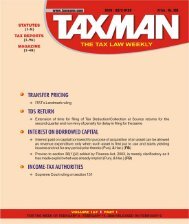news round up - Taxmann
news round up - Taxmann
news round up - Taxmann
- TAGS
- news
- round
- taxmann
- taxmann.com
You also want an ePaper? Increase the reach of your titles
YUMPU automatically turns print PDFs into web optimized ePapers that Google loves.
2010] GST - THE SCENARIO IN SOME OTHER COUNTRIES 119<br />
� GST postponement schemes would be provided to ease importers’<br />
cash-flow issues arising from GST.<br />
� The Government would be GST-registered to provide a level-playing<br />
field with the private sector.<br />
� A Tourist Refund Scheme would be included to allow visitors to<br />
obtain a refund of GST on goods they had purchased in Hong Kong<br />
and were taking home with them.<br />
� Charities would be treated as ‘taxable persons’ to allow them to<br />
reclaim input GST.<br />
An important aspect of Hong Kong’s GST had been that the Government<br />
proposed that, for the first five years after the GST’s introduction, all<br />
revenue it would generate after deducting administrative costs would be<br />
returned to the community as tax relief and other compensation measures.<br />
However, the GST was withdrawn in Hong Kong in a surprise<br />
announcement made on December 5, 2006. Henry Tang Ying-yen withdrew<br />
the plan citing lack of public s<strong>up</strong>port, ‘it’s clear .........that we have not<br />
been able to convince the majority to accept a GST as the main option to<br />
address the tax base problem’. The withdrawal was linked to the comments,<br />
three days earlier, of Chinese State leader Wu Bangguo to senior<br />
Hong Kong officials ‘to keep their fingers on the pulse of the people’ and<br />
to foster ‘social economy’, and to the impending sub-sector polls for the<br />
Election Committee which will pick the new Chief Executive in March<br />
2007. However, after the announcement, Henry Tang insisted that the<br />
decision to withdraw the proposal was ‘entirely my own’ and free of any<br />
political consideration.<br />
2.6 JAPAN’S GST - In Japan, the equivalent of VAT or GST is known as<br />
Consumption Tax (‘CT’), and was introduced in January 1989. It is similar<br />
to the European Union’s VAT system, requiring re-calculation and payments<br />
to the tax authorities at each transaction point in the onward sales<br />
chain. The Japanese CT rate is currently 5 per cent : 4 per cent national<br />
levy; 1 per cent regional levy.<br />
There is no requirement for companies to formally register with the<br />
Japanese tax authorities for CT. The tax authorities regards the first tax<br />
filing as the application for registration, and a tax office will be allocated<br />
to the company.<br />
For foreign companies providing goods or services in Japan, there may be<br />
a statutory obligation to charge CT. This includes the ongoing compliance<br />
requirements to file periodic tax returns, and pay over any CT due to the<br />
Japanese tax office. Typical situations requiring Japanese CT compliance<br />
include :—<br />
� Where goods are delivered within Japan;<br />
� If the foreign trader imports goods in Japan; and<br />
GOODS & SERVICES TAX CASES ❑ JANUARY 20 - FEBRUARY 4, 2010 ◆ 29











![“FORM NO. 3CEB [See rule 10E] Report from an ... - Taxmann](https://img.yumpu.com/45480232/1/190x245/form-no-3ceb-see-rule-10e-report-from-an-taxmann.jpg?quality=85)





